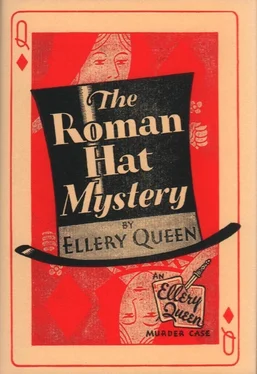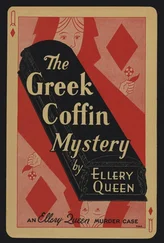As he crossed the carpet with short, quick steps Inspector Queen was far from impressive to the milling eyes that observed his approach from every side. And yet, so unusual was the gentle dignity of his appearance, so harmless and benevolent the smile that illumined his lined old face, that an audible rustle swept over the auditorium, preceding him in a strangely fitting manner.
In his own men the change was appreciable. Doyle retreated into a corner near the left exits. Detective-Sergeant Velie, poised over the body — sardonic, cold, untouched by the near-hysteria about him — relaxed a trifle, as if he were satisfied to relinquish his place in the sun. The bluecoats guarding the aisles saluted with alacrity. The nervous, muttering, angry audience sank back with an unreasoning relief.
Inspector Queen stepped forward and shook hands with Velie.
“Too bad, Thomas, my boy. I hear you were going home when this happened,” he murmured. To Doyle he smiled in a fatherly fashion. Then, in a mild pity, he peered down at the man on the floor. “Thomas,” he asked, “are all the exits covered?” Velie nodded.
The old man turned back and let his eyes travel interestedly about the scene. He asked a low-voiced question of Velie, who nodded his head in assent; then he crooked his finger at Doyle.
“Doyle, where are the people who were sitting in these seats?” He pointed to three chairs adjoining the dead man’s and four directly to the front of them in the preceding row.
The policeman appeared puzzled. “Didn’t see anybody there, Inspector...”
Queen stood silent for a moment, then waved Doyle back with the low remark to Velie, “In a crowded house, too... Remember that.” Velie raised his eyebrows gravely. “I’m cold on this whole business,” continued the Inspector genially. “All I can see right now are a dead man and a lot of perspiring people making noise. Have Hesse and Piggott direct traffic for a while, eh, son?”
Velie spoke sharply to two of the plainclothes men who had entered the theatre with the Inspector. They wriggled their way toward the rear and the people who had been crowding around found themselves pushed aside. Policemen joined the two detectives. The group of actors and actresses were ordered to move back. A section was roped off behind the central tier of seats and some fifty men and women packed into the small space. Quiet men circulated among them, instructing them to show their tickets and return to their seats one by one. Within five minutes not a member of the audience was left standing. The actors were cautioned to remain within the rope enclosure for the time being.
In the extreme left aisle Inspector Queen reached into his topcoat pocket, carefully extracted a brown carved snuffbox and took a pinch with every evidence of enjoyment.
“That’s more like it, Thomas,” he chuckled. “You know how fussy I am about noises... Who is the poor chap on the floor — do you know?”
Velie shook his head. “I haven’t even touched the body, Inspector,” he said. “I got here just a few minutes before you did. A man on the 47th Street beat called me up from his box and reported Doyle’s whistle. Doyle seems to have been doing things, sir... His lieutenant reports favorably on his record.”
“Ah,” said the Inspector, “ah, yes. Doyle. Come here, Doyle.”
The policeman stepped forward and saluted.
“Just what,” went on the little gray man, leaning comfortably against a seat back, “just what happened here, Doyle?”
“All I know about it, Inspector,” began Doyle, “is that a couple of minutes before the end of the second act this man” — he pointed to Pusak, who stood wretchedly in a corner — “came running up to me where I was standin’ in the back, watchin’ the show, and he says, ‘A man’s been murdered, officer!... A man’s murdered!’ He was blubberin’ like a baby and I thought he was pie-eyed. But I stepped mighty quick and came over here — the place was dark and there was a lot of shootin’ and screamin’ on the stage — and I took a look at the feller on the floor. I didn’t move him, but I felt his heart and there wasn’t anything to feel. To make sure he was croaked I asked for a doctor and a gent by the name of Stuttgard answered my call...”
Inspector Queen stood pertly, his head cocked on a side like a parrot’s. “That’s excellent,” he said. “Excellent, Doyle. I’ll question Dr. Stuttgard later. Then what happened?” he went on.
“Then,” continued the policeman, “then I got the usherette on this aisle to beat it back to the manager’s office for Panzer. Louis Panzer — that’s the manager right over there...”
Queen regarded Panzer, who was standing a few feet to the rear talking to Neilson, and nodded. “That’s Panzer, you say. All right, all right... Ellery! You got my message?”
He darted forward, brushing aside Panzer, who fell back apologetically, and clapped the shoulder of a tall young man who had slipped through the main door and was slowly looking about the scene. The old man passed his arm through the younger man’s.
“Haven’t inconvenienced you any, son? What bookstore did you haunt tonight? Ellery, I’m mighty glad you’re here!”
He dipped into his pocket, again extracted the snuffbox, sniffed deeply — so deeply that he sneezed — and looked up into his son’s face.
“As a matter of fact,” said Ellery Queen, his eyes restlessly roving, “I can’t return the compliment. You just lured me away from a perfect book-lover’s paradise. I was at the point of getting the dealer to let me have a priceless Falconer first edition, intending to borrow the money from you at headquarters. I telephoned — and here I am. A Falconer — Oh, well. Tomorrow will do, I suppose.”
The Inspector chuckled. “Now if you told me you were picking up an old snuffbox I might be interested. As it is — trot along. Looks as if we have some work tonight.”
They walked toward the little knot of men on the left, the old man’s hand grasping his son’s coatsleeve. Ellery Queen towered six inches above his father’s head. There was a square cut to his shoulders and an agreeable swing to his body as he walked. He was dressed in oxford gray and carried a light stick. On his nose perched what seemed an incongruous note in so athletic a man — a rimless pince-nez. But the brow above, the long delicate lines of the face, the bright eyes were those of a man of thought rather than action.
They joined the group at the body. Ellery was greeted respectfully by Velie. He bent over the seat, glanced earnestly at the dead man, and stepped back.
“Go on, Doyle,” said the Inspector briskly. “You looked at the body, detained the man who found it, got the manager... Then what?”
“Panzer at my orders closed all the doors at once and saw that no one either came in or went out,” answered Doyle. “There was a lot of fuss here with the audience, but nothing else happened.”
“Right, right!” said the Inspector, feeling for his snuffbox. “You did a mighty good job. Now — that gentleman there.”
He gestured in the direction of the trembling little man in the corner, who stepped forward hesitantly, licked his lips, looked about him with a helpless expression, and then stood silent.
“What’s your name?” asked the Inspector, in a kindly tone.
“Pusak — William Pusak,” said the man. “I’m a bookkeeper, sir. I was just—”
“One at a time, Pusak. Where were you sitting?”
Pusak pointed eagerly to the sixth seat from the aisle, in the last row. A frightened young girl in the fifth seat sat staring in their direction.
“I see,” said the Inspector. “Is that young lady with you?”
“Yes, sir — yes, sir. That’s my fiancée, sir. Her name is Esther — Esther Jablow...”
Читать дальше












